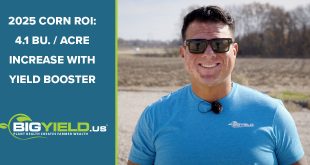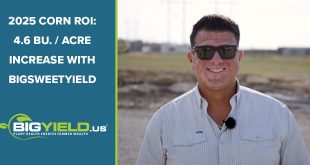Recently, our team at The Farm Research Center in Garden City, Mo. tried the Haney test for the first time. Regarded as a “21st century soil test,” according to a story from Agweek, the Haney test has the potential to add value in several ways.
The test’s developer, Richard Haney from the USDA Agricultural Research Service, describes that the test may enable producers to more efficiently use inputs and, as a result, manage input costs. If the test enables producers to more judiciously use inputs, then it could also provide some environmental benefits, based on an interview with Haney that Agweek published.
To run the Haney test, growers first extract a soil sample from 6 inches to 8 inches deep. Using the sample, the lab will run several analyses. According to Midwest Laboratories, the lab will then generate an overall soil health calculation. Scaled from 0 to more than 50, the calculation suggests the health of soil and its microbial life. Achieving higher readings would suggest better soil health.
Factors that affect the soil health calculation include the Solvita 1 Day CO2-C test result. It measures CO2-C emitted by soil microbes. A higher carbon dioxide level would suggest that the soil has more microbial activity, according to Midwest Laboratories. The Haney test also assesses water-extractable organic carbon and water-extractable organic nitrogen. Because soil microbes use carbon, the organic carbon reading can indicate whether the soil creates an environment conducive for soil microbes. With respect to organic nitrogen, soil microbes can convert it into inorganic nitrogen available to plants.
Growers interested in starting or continuing a soil health program may consider running a Haney test. The initial test would give a baseline view of soil health. From there, future tests could indicate whether additional soil improvement practices have changed soil health status. In this video, Kent Kauffman of BigYield.us explains more about using the Haney test.
At BigYield.us, we offer several solutions meant to enhance soil health. Our Dinosaur Dirt product is a humate that supplies soluble carbon to the soil. Soil microbial life use the carbon as a food source, which powers them to perform many critical functions. To further enhance soil carbon levels, we use the BigSweetYield cold-processed sweetener. It also can support vegetative and root growth, increase plant Brix levels and encourage big yields. Both Dinosaur Dirt and BigSweetYield serve as cost-effective tools to boost crop performance and ultimately drive yields.
To learn more about using the Haney test or improving soil health, please call or email anytime.
 BigYield High Yield Soybeans, High Yield Corn, and High Yield Wheat
BigYield High Yield Soybeans, High Yield Corn, and High Yield Wheat



